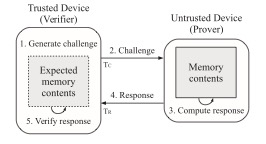
Rodrigo Vieira Steiner, EmilLupu, Towards more practical software-based attestation, J. Computer Networks, v. 149, pp 43-55, Elsevier, 2019.
Abstract: Software-based attestation promises to enable the integrity verification of untrusted devices without requiring any particular hardware. However, existing proposals rely on strong assumptions that hinder their deployment and might even weaken their security. One of such assumptions is that using the maximum known network round-trip time to define the attestation timeout allows all honest devices to reply in time. While this is normally true in controlled environments, it is generally false in real deployments and especially so in a scenario like the Internet of Things where numerous devices communicate over an intrinsically unreliable wireless medium. Moreover, a larger timeout demands more computations, consuming extra time and energy and restraining the untrusted device from performing its main tasks. In this paper, we review this fundamental and yet overlooked assumption and propose a novel stochastic approach that significantly improves the overall attestation performance. Our experimental evaluation with IoT devices communicating over real-world uncontrolled Wi-Fi networks demonstrates the practicality and superior performance of our approach that in comparison with the current state of the art solution reduces the total attestation time and energy consumption around seven times for honest devices and two times for malicious ones, while improving the detection rate of honest devices (8% higher TPR) without compromising security (0% FPR).